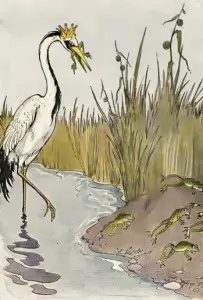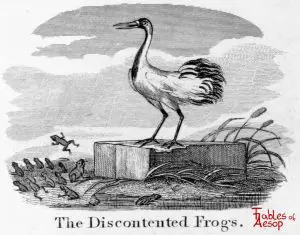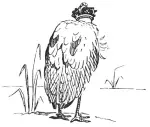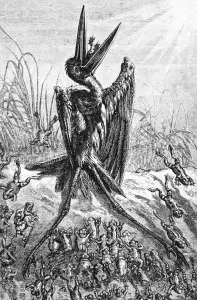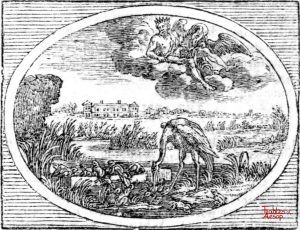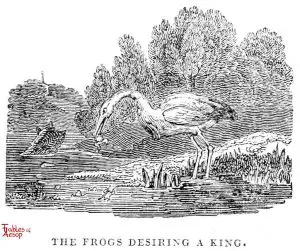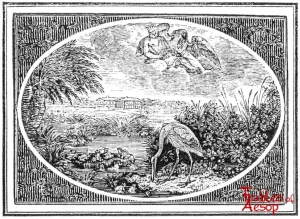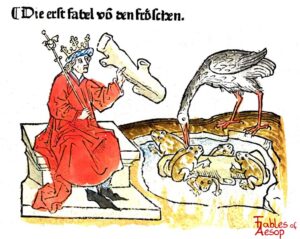Frogs prayed for a king but got a log. Prayed again and got a stork who started to have a feast on them.
People are never satisfied.

Aesop For Children (The Frogs Who Wished For a King)
The Frogs were tired of governing themselves. They had so much freedom that it had spoiled them, and they did nothing but sit around croaking in a bored manner and wishing for a government that could entertain them with the pomp and display of royalty, and rule them in a way to make them know they were being ruled. No milk and water government for them, they declared. So they sent a petition to Jupiter asking for a king.
Jupiter saw what simple and foolish creatures they were, but to keep them quiet and make them think they had a king he threw down a huge log, which fell into the water with a great splash. The Frogs hid themselves among the reeds and grasses, thinking the new king to be some fearful giant. But they soon discovered how tame and peaceable King Log was. In a short time the younger Frogs were using him for a diving platform, while the older Frogs made him a meeting place, where they complained loudly to Jupiter about the government.
To teach the Frogs a lesson the ruler of the gods now sent a Crane to be king of Frogland. The Crane proved to be a very different sort of king from old King Log. He gobbled up the poor Frogs right and left and they soon saw what fools they had been. In mournful croaks they begged Jupiter to take away the cruel tyrant before they should all be destroyed.
“How now!” cried Jupiter “Are you not yet content? You have what you asked for and so you have only yourselves to blame for your misfortunes.”
Moral
Be sure you can better your condition before you seek to change.

Eliot/Jacobs Version
The Frogs were living happily in a swamp that just suited them; they went splashing about caring for nobody and nobody troubling with them. But some of them thought this was not right; they should have a king. They therefore sent a petition to Jove to give them what they wanted. “Mighty Jove,” they cried, “send us a king that will rule over us and keep us in order.” Jove laughed at their croaking, and threw down a huge Log. The Frogs were frightened by the commotion in their midst. After a time, seeing that it did not move, one or two of the boldest of them ventured towards the Log, and even dared to touch it. Then all the Frogs came and did the same; and for some time the Frogs went about their business every day without taking the slightest notice of their new King Log. But this did not suit them, so they sent another petition to Jove, and said to him, “We want a real king; one that will really rule over us.” This made Jove angry, so he sent among them a big Stork that soon set to work gobbling them all up. The Frogs repented too late.

Jefferys Taylor
SOME frogs within a bog or ditch,
I really cannot tell you which;
Yet I prefer to say a bog,
For that you know best rhymes to frog:
These frogs, as Aesop’s muse-doth sing,
Requested they might have a king.
So Jupiter, in merry mood,
Straight threw them down a log of wood:
But who can say how much it splash’d,
Or who was frighten’d, who was mash’d?
Surprised that such should be the case,
Nor liking much this act of grace,
They kept aloof a day or two,
For fear of what he next might do.
“But see, how still he lies,” said they,
“Let’s go and hear what he will say.”
So they approach’d the royal log,
And there was one courageous frog
Who leap’d upon him, to inquire
What was his majesty’s desire;
But he of course no answer made;
So they, concluding he was dead,
Petitioned Jupiter again,
Who quickly sent them down a crane.
This gracious prince to all the nation
Then issued forth a proclamation;
In which the greatest and the least
Were all invited to a feast;
And so, on the appointed day,
Legions of frogs stopp’d up the way.
“Now” said the king, “upon this log
Is spread our feast; and any frog
Who to jump on may not be able,
I’ll raise him gently to the table.”
Enough was said, for every guest
Around the monarch’s person prest.
The king then made a gracious bend,
To help his subjects to ascend;
But so it was, as Aesop wrote,
He let them fall straight down his throat;
While those below thought all was right,
Although their friends were out of sight;
Till one, who something wrong suspected,
Leap’d up, and so the fraud detected.
Who can describe his feelings then?
My tongue cannot, nor can my pen:
Scarce was he up, ere he was down,
And made the whole transaction known.
Enough was said, for every frog,
Ere he had ceased, forsook the bog;
Croaking and groaning, as they went,
For their old form of government.
This fable Phaedrus did relate,
Referring to affairs of state:
But leaving politics alone
Till we’re a little older grown,
‘Twill be a safer way for us,
To take the author’s meaning thus,—
That folks well off should be content,
Nor make a change they may repent.

Caldecott
The Frogs were grieved at their own lawless condition, so they sent a deputation to Zeus begging him to provide them with a King. Zeus, perceiving their simplicity, dropped a Log of wood into the pool. At first the Frogs were terrified by the splash, and dived to the bottom; but after a while, seeing the Log remain motionless, they came up again, and got to despise it so much that they climbed up and sat on it. Dissatisfied with a King like that, they came again to Zeus and entreated him to change their ruler for them, the first being altogether too torpid. Then Zeus was exasperated with them, and sent them a Stork, by whom they were seized and eaten up.

JBR Collection
The Frogs living an easy, free sort of life among the lakes and ponds, once prayed Jupiter to send them a King. Jove being at that time in a merry mood, threw them a Log, saying, as he did so, “There, then, is a King for you.” Awed by the splash, the Frogs watched their King in fear and trembling, till at last, encouraged by his stillness, one more daring than the rest jumped upon the shoulder of his monarch. Soon, many others followed his example, and made merry on the back of their unresisting King. Speedily tiring of such a torpid ruler, they again petitioned Jupiter, and asked him to send them something more like a King. This time he sent them a Stork, who tossed them about and gobbled them up without mercy. They lost no time, therefore, in beseeching the god to give them again their former state. “No, no,” replied he; “a King that did you no harm did not please you. Make the best of the one you have, or you may chance to get a worse in his place.”

Townsend version
The Frogs, grieved at having no established Ruler, sent ambassadors to Jupiter entreating for a King. Perceiving their simplicity, he cast down a huge log into the lake. The Frogs were terrified at the splash occasioned by its fall and hid themselves in the depths of the pool. But as soon as they realized that the huge log was motionless, they swam again to the top of the water, dismissed their fears, climbed up, and began squatting on it in contempt. After some time they began to think themselves ill-treated in the appointment of so inert a Ruler, and sent a second deputation to Jupiter to pray that he would set over them another sovereign. He then gave them an Eel to govern them. When the Frogs discovered his easy good nature, they sent yet a third time to Jupiter to beg him to choose for them still another King. Jupiter, displeased with all their complaints, sent a Heron, who preyed upon the Frogs day by day till there were none left to croak upon the lake.

Samuel Croxall
THE Frogs, living an easy free life, every where among the lakes and ponds, assembled together, one day, in a very tumultuous manner, and petitioned Jupiter to let them have a king, who might inspect their morals, and make them live a little honester. Jupiter, being at that time in pretty good humour, was pleased to laugh heartily at their ridiculous request; and throwing a little log down into the pool, cried, There is a king for you! The sudden splash which this made by its fall into the water, at first terrified them so exceedingly, that they were afraid to come near it. But in a little time, seeing it lay still without moving, they ventured by degrees, to approach it; and at last, finding there was no danger, they leaped upon it; and, in short, treated it as familiarly as they pleased. But not contented with so insipid a king as this was, they sent their deputies to petition again for another sort of one; for this they neither did nor could like. Upon that, he sent them a Stork; who, without any ceremony, fell devouring and eating them up, one after another, as fast as he could. Then they applied themselves privately to Mercury, and got him to speak to Jupiter in their behalf, That he would be so good as to bless them again with another king, or restore them to their former state: No, says he, since it was their own choice, let the obstinate wretches suffer the punishment due to their folly.
THE APPLICATION
It is pretty extraordinary to find a fable of this kind, finished with so bold and yet polite a turn by Phaedrus: one who attained his freedom by the favour of Augustus, and wrote it in the time of Tiberius; who were, successively, tyrannical usurpers of the Roman government. If we may take his word for it, Aesop spoke it upon this occasion. When the commonwealth of Athens flourished under good wholesome laws of its own enacting, they relied so much upon the security of their liberty, that they negligently suffered it to run out into licentiousness. And factions happening to be fomented among them by designing people, much about the same time, Pisistratus took that opportunity to make himself master of their citadel and liberties both together The Athenians finding themselves in a state of slavery, though their tyrant happened to be a very merciful one, yet could not bear the thoughts of it: so that Aesop, where there was no remedy, prescribes them to patience by the example of the foregoing fable: and adds, at last, “Wherefore, my dear countrymen, be contented with your present condition, bad as it is, for fear a change should be worse.”

Thomas Bewick (The Frogs and Their King)
In antient [SIC] times, the nation of Frogs lived an easy free life among their lakes and ponds; but at length grew dissatisfied with such a continuance of undisturbed tranquillity, and petitioned Jupiter for a king. Jupiter smiled at their folly, and threw them down a log of wood, and with a thundering voice said, “there is a king for you.” With this, and the sudden splash it made in the water, they were at first quite panic-struck, and for some time durst not put their heads up; but by degrees they ventured to take a peep, and at length even to leap upon the log. Not being pleased with so tame and insipid a king, they again petitioned Jupiter for another, who would exert more authority. Jupiter, disgusted at their importunate folly, sent them a Stork for their king, who, without ceremony, eat them up whenever his craving appetite required a supply.
APPLICATION.
This Fable is said to have been spoken by Aesop to the Athenians, who had nourished under their commonwealth, and lived under good and wholesome laws of their own enacting, until, in process of time, they suffered their liberty to run into licentiousness; and factious designing men fomented divisions, and raised animosities among them. When thus rendered weak, Pisistratus took the advantage, and seized upon their citadel and liberties both together. The Athenians finding themselves in a state of slavery, though their tyrant happened to be a merciful one, could not bear the thoughts of it; but Aesop in reciting the Fable to them, prescribes patience where there was no other remedy, and adds, at last, “Wherefore, my dear countrymen, be contented with your present condition, bad as it is, for fear a change should make it worse.”
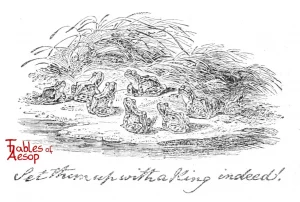

L’Estrange version
In the days of old, when the frogs were all at liberty in the lakes, and grown quite weary of living without government, they petition’d Jupiter for a king, to the end that there might be some distinction of good and evil, by certain equitable rules and methods of reward and punishment. Jupiter, that knew the vanity of their hearts, threw them down a log for their governour; which upon the first dash, frighted the whole mobile of them into the mudd for the very fear on’t. This panick terror kept them in awe for a while, ’till in good time, one frog, bolder than the rest, put up his head, and look’d about him, to see how squares went with their new king. Upon this, he calls his fellow-subjects together; opens the truth of the case; and nothing would serve them then, but riding a-top of him, insomuch that the dread they were in before, is now turned into insolence, and tumult. This king they said was too tame for them, and Jupiter must needs be entreated to send ’em another: he did so, but authors are divided upon it, whether ’twas a stork, or a serpent; though whether of the two soever it was, he left them neither liberty, nor property, but made a prey of his subjects. Such was their condition in fine, that they sent Mercury to Jupiter yet once again for another king, whose answer was this: They that will not be contented when they are well, must be patient when things are amiss with them; and people had better rest where they are, than go farther, and fare worse.
Moral
The mobile are uneasie without a ruler: they are as restless with one; and the oft’ner they shift, the worse they are; so that government or no government; a king of God’s making, or of the peoples, or none at all; the multitude are never to be satisfied.

Crane Poetry Visual
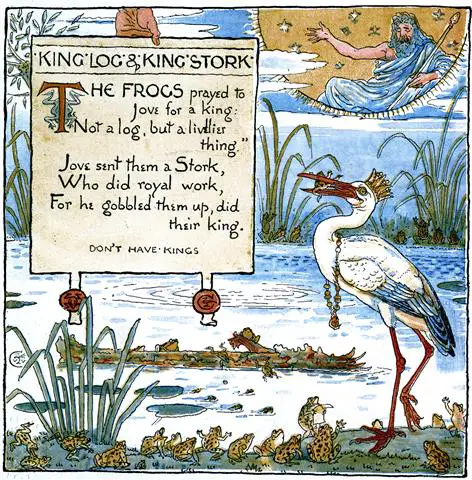
The Frogs prayed to Jove for a king:
“Not a log, but a livelier thing.”
Jove sent them a Stork,
Who did royal work,
For he gobbled them up, did their king.
Don’t have kings.

Heinrich Steinhöwel (Of Jupiter and the Frogs)

Ranae et Iuppiter
Ranae olim clamore magno regem petierunt a Iove. Ridet Pater Deorum atque magnum truncum e caelo in paludem deiicit. Subito motu aquarum sonoque perterritae, mergunt et latent in limo. Forte una profert e stagno caput et, explorato rege, cunctas evocat. Illae, timore posito, adnatant; mox petulans turba in truncum insilit. Alium regem postulant, quoniam inutilis esset qui fuerat datus. Tum Iuppiter misit ciconiam. Ea uno die magnum ranarum numerum dilacerat, iugulat, vivas alias devorat. Reliquae, mersae, lugent, flent, orant ut ab hac calamitate liberentur. Sed Deum non movent querelae ac lacrimae. “Benignum,” inquit, “et placidum regem non tulistis; iam ferum et barbarum fertote!”
Moral
Minus perferte, maius ne veniat malum.
Perry #44
